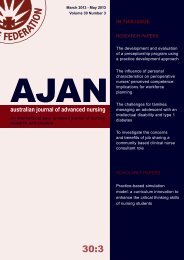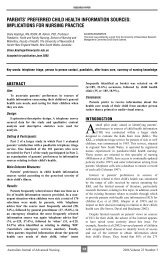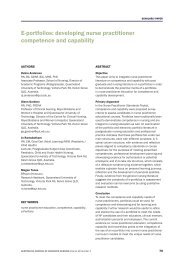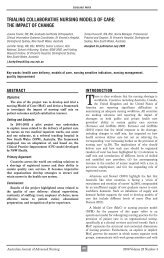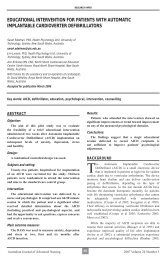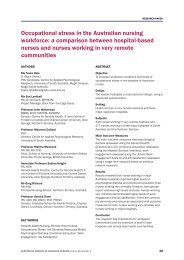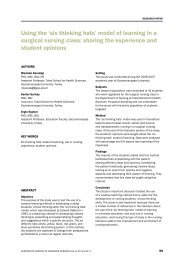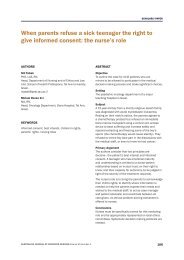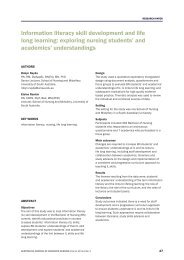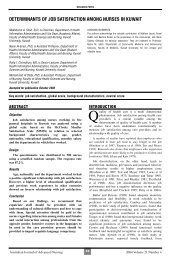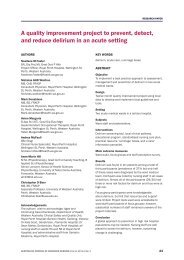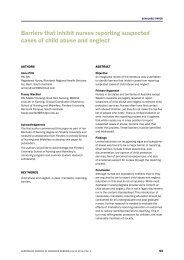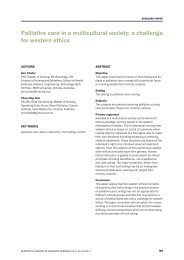australian journal of advanced nursing
australian journal of advanced nursing
australian journal of advanced nursing
You also want an ePaper? Increase the reach of your titles
YUMPU automatically turns print PDFs into web optimized ePapers that Google loves.
Despite organisational barriers, the positive ‘payback’<br />
from <strong>nursing</strong> research has also been reported in<br />
the literature. Buxton and Hanney (1996) identified<br />
several benefits from research including knowledge<br />
generation, workplace efficiencies; cost savings<br />
attributed to a healthier workforce and better decision<br />
making based on up to date information. These<br />
types <strong>of</strong> benefit were acknowledged by respondents<br />
in this survey.<br />
A majority <strong>of</strong> respondents presented their findings<br />
at a national conference, were published in a peer<br />
reviewed <strong>journal</strong> or in an international <strong>journal</strong>.<br />
A significant number <strong>of</strong> respondents presented<br />
their findings to an international audience. The<br />
results reflect the maturity <strong>of</strong> Australian <strong>nursing</strong><br />
and midwifery research and its ability to make a<br />
significant contribution to research based knowledge<br />
on the world stage.<br />
Not surprisingly, all respondents identified that<br />
their project made a positive contribution toward<br />
pr<strong>of</strong>essional development and towards health<br />
care in general. Research projects have resulted<br />
in improvements to educational programs for<br />
<strong>nursing</strong> and midwifery students, identification <strong>of</strong><br />
gaps in service delivery with recommendations<br />
for improvement, improved <strong>nursing</strong> and midwifery<br />
practices, technological advancement in <strong>nursing</strong><br />
and midwifery care and a greater understanding <strong>of</strong><br />
the patient experience when accessing the health<br />
care system. All <strong>of</strong> the research outcomes reflect<br />
the many positive contributions to health care that<br />
research grant recipients have made.<br />
Themes explicated from the qualitative results <strong>of</strong><br />
this survey demonstrate that several <strong>of</strong> the funded<br />
research projects led to a change in practice and/<br />
or policy, contributed to health care knowledge<br />
or provided the impetus for further research. The<br />
findings from this survey support recommendations<br />
from literature proposing that <strong>nursing</strong> research<br />
should be aligned to the notion <strong>of</strong> care (Cox 2009).<br />
There was clear evidence from the outcomes<br />
generated by respondents that research projects<br />
were centred on a notion <strong>of</strong> care, whether directly or<br />
indirectly provided to health care consumers.<br />
RESEARCH PAPER<br />
Lack <strong>of</strong> funding was a concern addressed by<br />
respondents whose statements echoed one<br />
assertion that, funding for <strong>nursing</strong> is not readily<br />
available. The comments are supported in literature<br />
recognising that <strong>nursing</strong> and midwifery research<br />
is underfunded (Polit and Beck 2009; Cox 2009;<br />
Pearson 2004). Where funding has been made<br />
available, it is <strong>of</strong>ten sourced from pr<strong>of</strong>essional <strong>nursing</strong><br />
associations (Borbasi et al 2002). The reality that very<br />
little funding is available for <strong>nursing</strong> and midwifery<br />
research provides a strong argument for pr<strong>of</strong>essional<br />
<strong>nursing</strong> and midwifery organisations to take up the<br />
challenge and consider the overall benefits to the<br />
pr<strong>of</strong>ession and to health care consumers in providing<br />
funding for nurse and midwifery research.<br />
CONCLUSION<br />
The survey results indicate that nurse and midwife<br />
researchers are conducting a broad range <strong>of</strong><br />
research studies that make a significant contribution<br />
to development <strong>of</strong> the <strong>nursing</strong> and midwifery<br />
pr<strong>of</strong>essions and to health care in general despite<br />
workload and other barriers. Respondents were able<br />
to demonstrate the benefits <strong>of</strong> their research projects<br />
through changes to clinical practice, policy change<br />
or through the formation <strong>of</strong> pr<strong>of</strong>essional networks<br />
that contributed to the critical mass <strong>of</strong> nurse and<br />
midwifery research based knowledge. Moreover,<br />
most respondents were able to disseminate their<br />
knowledge and research findings through various<br />
media on a national and international basis. The<br />
results <strong>of</strong> this survey demonstrate the importance<br />
<strong>of</strong> a continuing commitment to nurse and midwifery<br />
led research. An ongoing commitment to <strong>nursing</strong> and<br />
midwifery led research will ensure that health care<br />
recipients are provided with up to date evidence<br />
based practice. Continued support for <strong>nursing</strong> and<br />
midwifery led research will sustain the current ability<br />
<strong>of</strong> Australian <strong>nursing</strong> and midwifery researchers to<br />
make an important contribution to health care on an<br />
international level, thus contribute to improvements<br />
in health care on a worldwide basis.<br />
Limitations <strong>of</strong> the survey<br />
The response rate <strong>of</strong> thirty three per cent (33%)<br />
was relatively low. This was attributed to survey<br />
distribution towards the end <strong>of</strong> the academic year<br />
AUSTRALIAN JOURNAL OF ADVANCED NURSING Volume 28 Number 3 20



